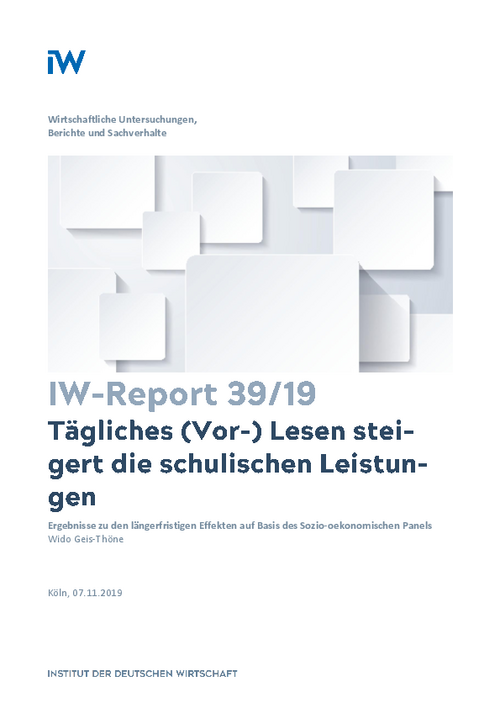It is well known and not controversial that it is very conducive to the development of children, when they initially get read out regularly and later read for themselves. Nevertheless, there are no empirical studies for Germany that prove and quantify the long-term effects.

Results on long-term effects based on the Socio-Economic Panel: Daily (pre-) reading improves school performance
IW-Report

It is well known and not controversial that it is very conducive to the development of children, when they initially get read out regularly and later read for themselves. Nevertheless, there are no empirical studies for Germany that prove and quantify the long-term effects.
Against this background, a multivariate analysis based on the Socio-Economic Panel (SOEP) was conducted to analyse how daily reading out at the age of six years and reading at the age of ten years affect school grades four years later as well as the transition to secondary education. In order to determine the causal relationship, it was controlled for the family background of the children, since this can influence reading behaviour as well as school success. As a result, children who read daily at the age of ten years are 10 percent more likely to attend German high-track secondary schools when they reach the age of fourteen. There is also a positive effect in the order of three percentage points for daily reading at the age of six. However, due to the large measurement inaccuracy, it cannot be completely ruled out that there is no connection at all. The situation is different when it comes to the grade in the subject German at the age of ten, which is 0.18 better for the children who got regularly read out at the age of six. If children at the age of 10 years read in their leisure time daily, their grade in German at age fourteen is by 0.21 better, which equals almost a quarter of a grade. Amounting to 0.25, the effect on the grade in the first foreign language is even slightly larger. The grades in mathematics also tend to be better for children who have been read out and who read daily.
In order to maximize the benefits of reading, the promotion of reading in kindergartens and primary schools should be significantly expanded. Volunteer readers are already making a major contribution here and their commitment should be further promoted. Especially, in kindergartens and schools with a large share of children with parental homes in which reading and reading out is rare, the regular staff should promote reading more and the staff should be increased accordingly. If primary school children are successfully motivated to read regularly, they are also more likely to do so in their youth. According to multivariate analyses based on the SOEP, the reading biographies have a high degree of continuity once children are able to read themselves, whereas the influence of the family background decreases with age.

Wido Geis-Thöne: Tägliches (Vor-) Lesen steigert die schulischen Leistungen – Ergebnisse zu den längerfristigen Effekten auf Basis des Sozio-oekonomsichen Panels
IW-Report

More on the topic

Parental contributions for childcare in a regional comparison
The federal states take very different approaches to organising parental participation in the costs of state and state-funded childcare.
IW
Teaching hours at elementary school country comparison
Young people's educational paths are very much predetermined during their primary school years. On the one hand, the basic skills of reading, writing and maths are acquired, and, on the other hand, the joint learning of all children ends with the transition to ...
IW